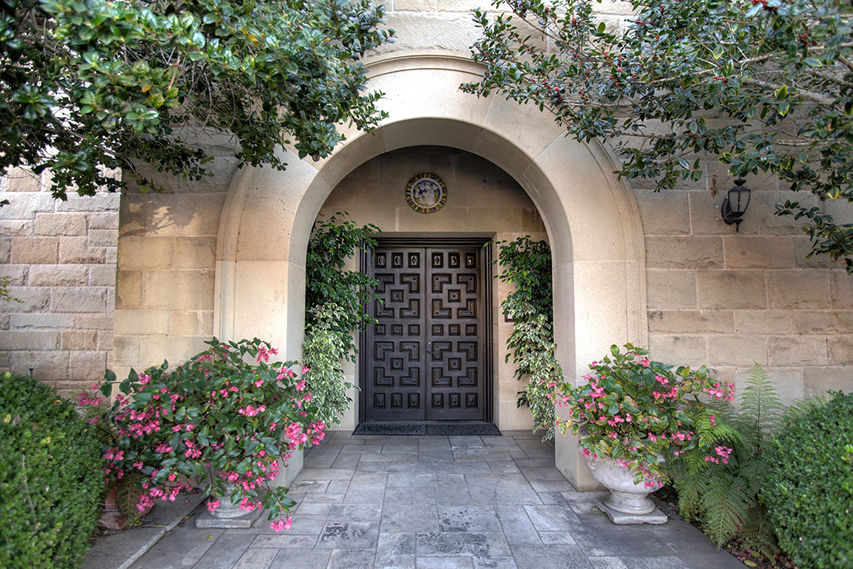The Center for Spiritual Renewal, located on the grounds of the nonprofit retreat center La Casa de Maria in Montecito near Santa Barbara, is a house designated for personal retreats.
A ministry of the Immaculate Heart Community, the center is located on El Bosque Road — “el bosque” means “woodlands” — and the 26-acre grounds are studded with towering live oaks and other gorgeous old-growth trees. Footpaths meander through citrus orchards, an organic garden and onto a hiking trail that goes miles into the Los Padres National Forest.
Everywhere is a tucked-away bench, overhung with hydrangeas or bougainvillea or toyon, on which to ponder. My first night, I sat overlooking San Ysidro Creek and watched the sycamore trunks turn molten gold in the setting sun.
The house, the former novitiate for the Sisters of the Immaculate Heart of Mary, is baronial: nine “distinctive fireplace mantels” imported from Italy, huge bathrooms with majestic sinks, teak-paneled ceilings, wrought-iron staircases, a library. Outside one spacious terrace faces south, another east.
Though the tradition and spirit are Christ-centered, the Center for Spiritual Renewal is ecumenical and interfaith.
Stays are generally Tuesday night through Sunday morning, or some smaller portion thereof. Three beautifully prepared meals are provided with the room rate. Tuesday night no dinner is offered, but the kitchen is stocked with yogurt, breads, nut butters, fresh fruit from the garden, juice, coffee and tea. Or you can bring whatever food you like and store it in the fridge.
One dinner consisted of chicken grilled on the back patio, roasted Brussels sprouts and sweet potatoes, and a salad of “massaged” kale, pecans and sheep’s milk cheese. Everything is organic and gluten-free and vegan selections were also available.
Personally, I’m a “freegan” — if it’s free, I’ll eat it. Also, I’m a very early riser and a coffee hound, so I was relieved to discover I could creep down to the kitchen at 5 a.m. to make my own personal pot.
One logistical tip for noise-sensitive types such as me: there are several downstairs bedrooms, some with shared bathrooms. The upstairs bedrooms are $20 more and 100 percent roomier, and, more importantly, quieter. The downstairs room I had booked was immaculate, charming and had a lovely view, but was also hard by the administrative offices and the kitchen.
When I asked if there might be another room available, the staff could not have been more accommodating or more pleasant. I got whisked up to Room 6, which had a gorgeous view of the mountains and a little balcony.
When I went out there to sit for a bit, a blue jay alighted on the railing less than 2 feet from my face and perched there for a good 30 seconds. I was convinced the creature had sensed my calming Christ-like love. Later I learned he was actually hoping I would feed him. Still, to observe the slightly raised black patch around his eye — as if it had been basted on from a separate bolt of cloth — was thrilling.
“Gentle quiet” is observed. In other words, no one is going to glare at you if you say, “Good morning,” but let’s not stomp around braying into our cell phones. But don’t worry; there’s no cell reception anyway, or at least no T-Mobile access, and there is no Wi-Fi. (You can walk down El Bosque Road about a quarter of a mile if you really need to check your phone.)
On the second floor is Blessed Sacrament chapel, open 24 hours a day, where Sister Pauline (who has lived at the center for 47 years) leads Centering Prayer daily. Retreatants are encouraged to stay on the grounds, but I did leave to attend 7:45 a.m. daily Mass at Our Lady of Carmel, which is a seven-minute drive away.
The center also features a sand tray and, for a small extra fee, yoga, massage or Embodied Personal Practice.
I stayed three nights and two full days. My time at the center was restorative.
While there I picked up and opened two books at random. One was “Legacy of the Heart: The Spiritual Advantages of a Painful Childhood” by Wayne Muller. “What if suffering and death are simply given to us,” Muller wrote, “just as joy and wonder and hunger and ecstasy are given? What if pain is not an injustice, not something to be figured out, not someone’s fault?”
The other was Karl Rahner’s “Spiritual Exercises.” Here I was drawn to a chapter called “The Hidden Life of Our Lord.” Thinking of my friends back home — many of whom consider my Catholicism a perplexing aberration about which the less said, the better — I read:
“We do not need any special psychological talent to perceive that remaining in the temple must have brought about a tormenting loneliness in the child Jesus. … It must have been very painful for the heart of Jesus that he could not explain his conduct to his mother, and that she did not even understand him when he told her what he was about.”
For more information about the Center for Spiritual Renewal at La Casa de Maria, call (805) 969-2474, email [email protected] or go to www.lacasademaria.org/retreats.

